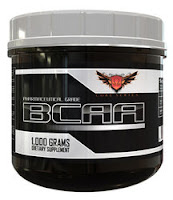BCAA Ward Off Body Fat Gain on Hypercaloric High Fat Diet: Branch-Chained Amino Acid Feeding Triggers Favorable Metabolic Changes in Diet-Induced Obese Mice.
 |
| When it comes to BCAA products, stick to the basics. There is a reason nature has them in the 2:1:1 ratio. |
What the scientists found was that mice, who were fed a hypercaloric high fat (45%) diet for 6 weeks, gained significantly less weight, if their drinking water was enriched with BCAAs in the course of the last 2 weeks.
The BCAA-treated group gained almost 7% less body weight and had less epididymal adipose tissue (WAT) mass than the control group (p<0.05). BCAA supplementation also reduced the hepatic and skeletal muscle triglyceride (TG) concentrations (p<0.05).The reason for this "anti-obesity" effect of BCAAs, the scientists speculate, is the increase of hepatic PPAR-alpha and uncoupling protein (UCP) 2, and PPAR-alpha and UCP3 in the skeletal muscle, respectively. While the upregulation in PPAR-alpha would be responsible for the reduction in blood (& muscle) triglycerides (other than total cholesterol a reliable risk factor of heart disease & diabetes), the increases in uncoupling protein (put simply) render the mitochondrial wall more permeable for protons and thus increases the dissipation of energy as heat. In consequence of these BCAA-triggered adaptations, the mice spent more energy and "burned" more fat.
 |
| Figure 1: Glucose, Insulin, Triglycerides and Free Fatty Acids in Control and BCAA treated DIO mice (data adapted from Arakava. 2011) |
Despite the fact that applicability of the results of rodent studies to human beings (and I am referring to thermogenic effects, in particular) is still questionable, the take home message of this study is to look into the physiological effects of individual nutrients rather than into their energy equivalent in calories to evaluate their use and usefulness in weight loss and weight gain (remember BCAAs are a promising adjunct to cancer therapy and other conditions associated with muscle loss and/or wasting, as well, cf. Tazi. 2010).


